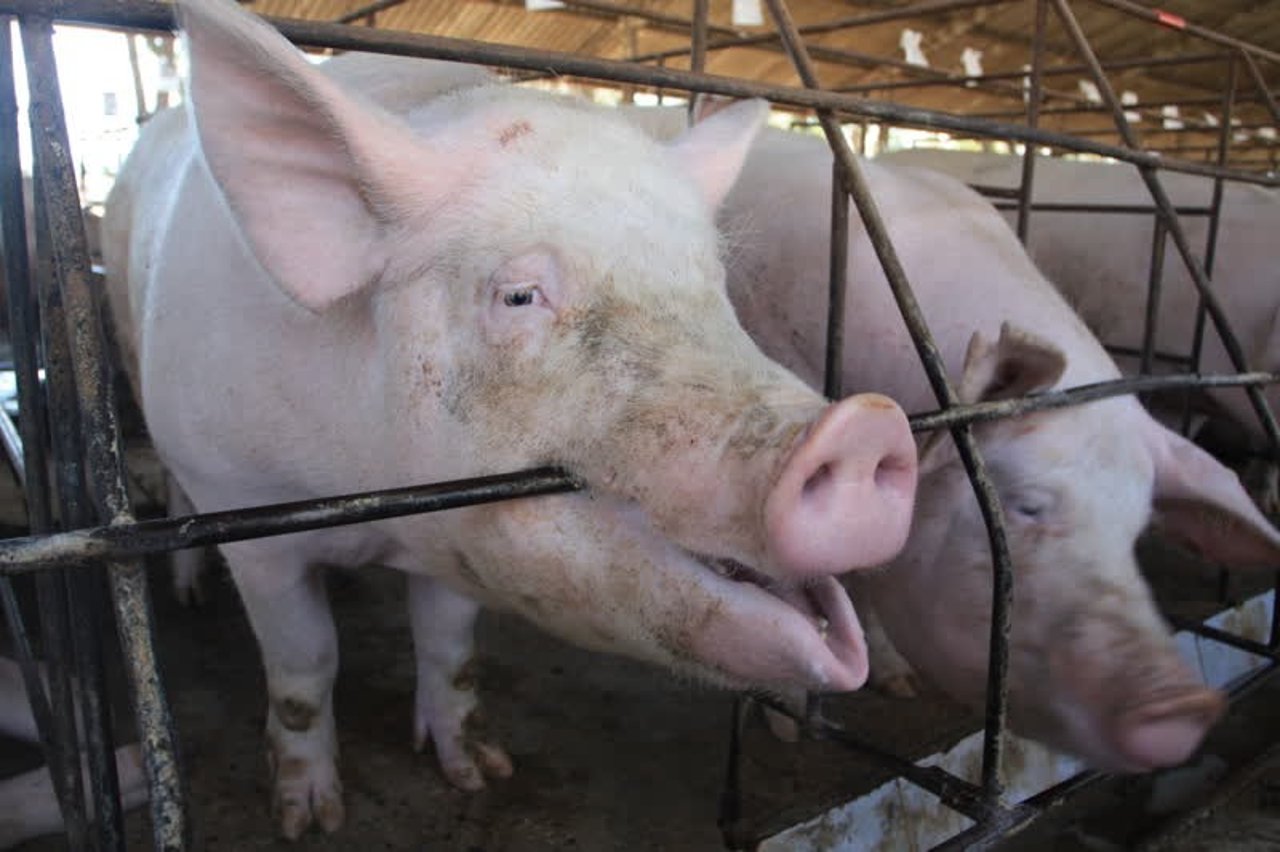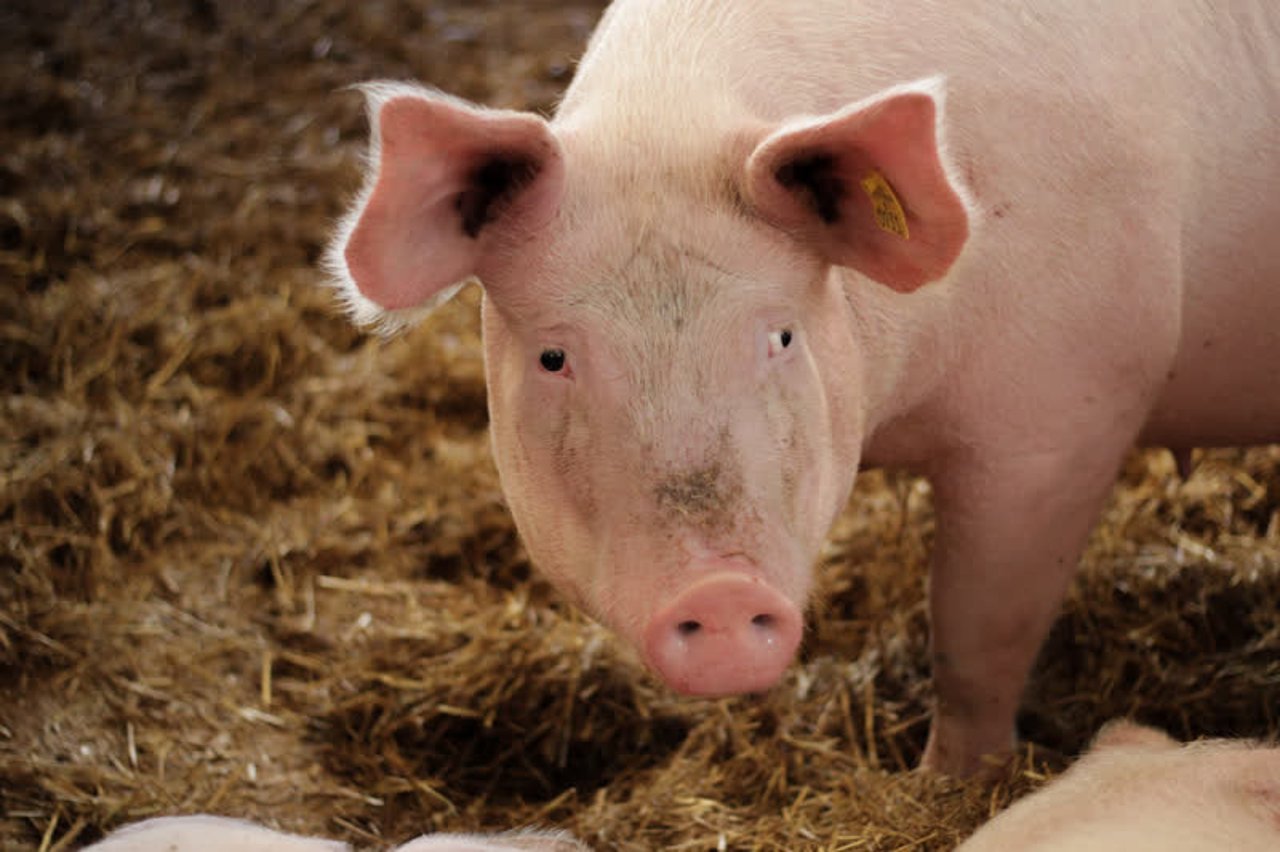
A tale of two pigs: which life would you choose?
News
There are shocking contrasts in the health and well-being of pregnant mother pigs on high-welfare and low-welfare farms. With your help, we can give mother pigs better lives
A mother pig wakes up feeling hungry and sore. She has been lying on a hard, concrete floor with no bedding and has an itch on her back that she has no way of scratching.
She is in a tiny metal cage, in which she cannot turn around or move more than a few centimeters from side to side. Surrounding her is a sea of fellow mother pigs, also confined to tiny cages.
She struggles to climb to her feet in the small space.
The floor is made of concrete slats so that her feces will fall through, which keeps the space cleaner but makes it uncomfortable on her feet.
This mother pig has spent three months inside this cage and has developed painful sores from the metal bars and hard slats.
Mother pigs (sows) at this farm are either kept in group housing or cages as the farm is transitioning to have higher welfare conditions.
The barn has no natural light and the body heat radiating from the other pigs makes the air thick and stale.
The extractor fans aren’t strong enough to ventilate the room and there is a harsh smell of ammonia that makes it difficult to breathe and gives her lung infections. She hasn’t walked for months and her muscles are growing weak and starting to waste.
She is fed at the same time every day and gets stressed due to the noise of the feeders coming in to fill her trough.
The sound of pigs squealing with intense anticipation fills the barn with a high-pitched noise. The feed she receives is concentrated and will not be enough to satisfy her hunger. This small meal is all she can occupy herself with for the entire day.
She has a strong urge to forage and root but with nothing around her to explore, she begins to chew on the bars of the metal cage in frustration. All she can do is lie, stand or chew on the metal bars.
Tomorrow, she will have no other choice but to do the same. In fact, for almost every day for the rest of her life, she will be trapped in this cage.
A focus on space and enrichment
A different mother pig on a different farm wakes in a barn where she is lying on a bed of straw surrounded by fellow mother pigs sleeping against her for comfort. She gets up and walks across the barn to the water drinkers.
There are other pigs awake too and they rub snouts to greet each other. The barn is open on the sides, which provides fresh air, ventilation and sunlight.
She has the freedom to choose her companions among the group and where she wants to spend her time and rest comfortably.
When she is hungry, she walks to the feeding station. An electronic tag in her ear is read by the feeding machine, which opens a door allowing only her to enter.
The machine knows her weight and size and dietary needs, and drops a portion of the food she gets each day into the trough so that she can return for more later.
Back out in the barn, she puts her nose to good use and forages through the thick straw. She eats some straw to fill in the gaps between meals. Pigs’ stomachs are well adapted to a diet with lots of roughage, so this is good for her – it fills her stomach and stops her from feeling hungry.
Her friends are rooting around as well, occasionally tossing straw in the air.
She goes to drink again and then stops to scratch her back on the special brushes that have been installed in the barn. She enjoys scratching her back in this way, and may use the brushes whenever she pleases.
She then goes in search of the mother pigs that she is closest with and lies down next to them to rest while the sun warms her back.
Enriched environments, where pregnant mother pigs (sows) are able to forage, rest comfortably, nest or play with materials such as straw, help them display their natural behaviors and gives them a good life worth living.
There is a shocking contrast in the health and well-being of two pregnant mother pigs on two different farms, with different welfare standards.
The freedom to feed, bond, scratch, and eat is afforded to the mother pig in a healthy group housing environment.
She has friends to bond with and doesn’t feel discomfort during a critical stage in her pregnancy.
In contrast, the pregnant mother pig caged for pregnancy wakes up hungry, itchy, in pain and frustrated.
She’s been trapped in a tiny cage on top of a hard-concrete floor and hasn’t walked in months.
Act today
You can help end pigs’ suffering by eating less pork and by choosing higher-welfare pork when you do eat it. Less demand for pork from factory-farmed pigs means fewer pigs will suffer.
The sound of pigs squealing with intense anticipation fills the barn with a high-pitched noise. The feed she receives is concentrated, and will not be enough to satisfy her hunger.

